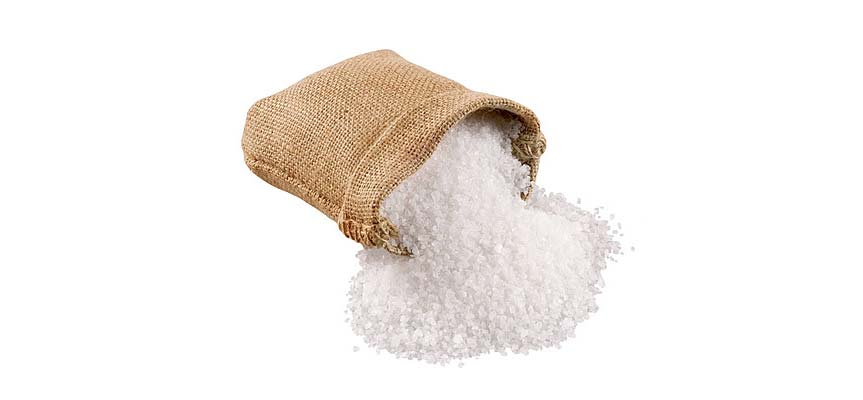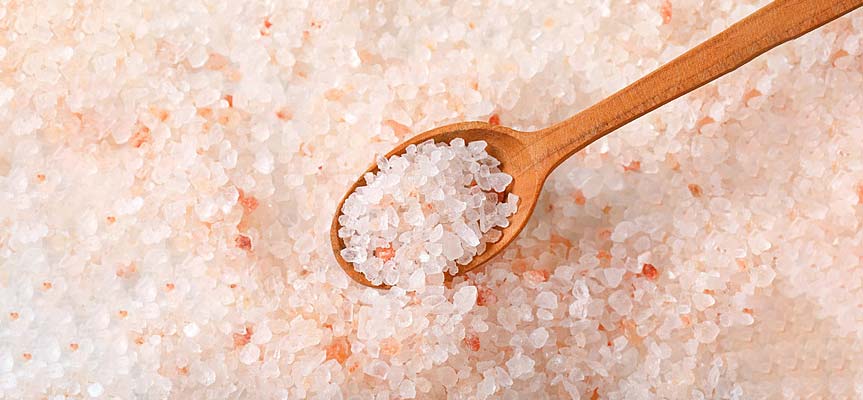In recent years, the importance of reducing table salt or sodium chloride consumption to maintain body health and prevent cardiovascular diseases and high blood pressure has gained increasing attention. Among these, potassium salt has been recognized as a natural and healthy alternative with many benefits for human health. The use of potassium salt, especially in low-sodium diets and healthy nutrition, has found a special place. In this article, we aim to comprehensively and professionally examine the benefits of using potassium salt, its effect on blood pressure control and heart health, and the role of potassium in the body. Additionally, we will introduce potassium salt and highlight the advantages of purchasing this product in the Iranian market.
What is Potassium Salt?
Potassium salt is a natural substitute for ordinary salt or sodium chloride, mainly composed of potassium chloride. This substance is found in nature both as a mineral and in the form of plant-based salts. Unlike ordinary salt, whose excessive consumption leads to increased blood pressure and heart problems, potassium salt helps regulate blood pressure and improve cardiovascular function by reducing sodium absorption and increasing potassium levels in the body.
Differences Between Potassium Salt and Ordinary Salt
When the word “salt” comes up, most people immediately think of common table salt or sodium chloride—a staple on dining tables everywhere. However, the difference between this type of salt and “potassium salt” is fundamental and significant.
Common table salt consists of sodium and chlorine elements. Excessive sodium intake can lead to high blood pressure, fluid retention, and damage to blood vessels—factors that increase the risk of heart disease, stroke, and kidney failure.
In contrast, in potassium salt, potassium replaces sodium. Potassium is an essential electrolyte for the body that not only helps regulate blood pressure but also plays a critical role in improving muscle function and the nervous system.
In terms of taste, potassium salt has a slight natural bitterness, which many people get used to over time or balance by mixing it with regular salt. Overall, the use of potassium salt is a scientific and natural approach to reducing the harmful effects of excessive sodium consumption—especially for those with high blood pressure or heart disease.
Benefits of Potassium Salt for Cardiovascular Health
The heart, a powerful and vital muscle, requires a proper balance of electrolytes for its correct function. The potassium in potassium salt plays a key role in regulating heartbeats and cardiac muscle contractions.
Adequate potassium intake helps maintain appropriate pressure in blood vessels and prevents the hardening of vessel walls. This reduces the pressure on vessels and prevents diseases such as atherosclerosis (hardening of the arteries) and vascular blockage.
Moreover, potassium helps regulate body fluids, maintaining blood volume balance, which effectively controls blood pressure and prevents heart failure.
Numerous research findings show that regular potassium consumption can reduce the risk of heart attacks and strokes, control irregular heart rhythms, and improve overall cardiovascular health.
Therefore, using potassium salt is a smart measure to enhance heart and vascular health, bringing significant benefits by reducing sodium intake.

The Effect of Potassium Salt on Blood Pressure Control
One of the primary scientific reasons behind medical recommendations to reduce common salt intake is the direct effect of sodium on increasing blood pressure. Sodium retains excess water in the body, increasing blood volume and thus exerting more pressure on blood vessel walls.
Potassium salt addresses this problem in two ways: first, sodium content is minimal or absent; second, the potassium present helps eliminate excess sodium from the body. Potassium enhances kidney function to excrete sodium through urine.
This process helps reduce blood pressure and is especially crucial for those with hypertension or at risk of heart diseases.
Global studies have shown that adequate potassium intake can significantly lower both systolic and diastolic blood pressure, and regular potassium salt consumption stabilizes this effect.
Therefore, potassium salt has been approved by reputable health organizations as a practical and scientific solution for blood pressure control.
Potassium Salt for Low-Sodium Diets
Low-sodium diets are fundamental for preventing and managing cardiovascular and kidney diseases. However, reducing common salt in diets does not mean sacrificing food flavor but requires healthy and effective substitutes.
Potassium salt, as a natural alternative, allows individuals to control sodium intake without reducing dietary enjoyment. This is particularly vital for people needing sodium-restricted diets, including those with hypertension, heart failure, and kidney diseases.
Additionally, the potassium in this salt maintains electrolyte balance, improves muscle function, and enhances overall body health.
In fact, potassium salt, besides reducing sodium, acts as an important mineral supplement for maintaining general health in low-sodium diets.
Smart and controlled use of this salt can easily solve many problems caused by excessive consumption of ordinary salt.
The Role of Potassium in Kidney and Muscle Function
Potassium is one of the most important electrolytes in the body, playing a key role in regulating kidney function, fluid balance, and nerve signal transmission.
Kidneys use potassium to excrete excess sodium and control blood pressure. Potassium deficiency disrupts kidney function, causes fluid retention, and raises blood pressure.
In muscles, potassium is essential for nerve signal transmission and muscle contraction. Potassium imbalance can lead to muscle weakness, cramps, and even more serious problems like cardiac arrhythmia.
Therefore, sufficient potassium intake through diet or supplements such as potassium salt is vital for kidney health and muscle function.
Potassium salt, by supplying this important element, prevents disorders related to potassium deficiency while reducing sodium intake.
Potassium Salt as a Substitute for Ordinary Salt in Hypertensive Patients
Patients with high blood pressure, due to sodium sensitivity, must limit their intake of common salt. Potassium salt serves as a suitable alternative, allowing salt consumption without the risks associated with sodium. This benefit has led doctors and nutritionists to recommend potassium salt use.
Herbal Salt and Its Properties
Herbal salts are salts extracted from natural and plant sources, usually containing potassium, magnesium, calcium, and other beneficial minerals. Unlike ordinary salt, these salts are rich in natural nutrients that help maintain electrolyte balance and improve overall health.
Herbal salt is a natural and healthy option to replace table salt, helping reduce sodium intake while increasing potassium and other minerals.
Besides therapeutic properties, herbal salt usually has a more balanced and pleasant taste and is widely used in healthy cooking and special diets.
Some of the most important properties of herbal salt include improving heart function, controlling blood pressure, strengthening the immune system, and supporting skin and hair health.

The Impact of Sodium Reduction on Health
Reducing sodium consumption by replacing common salt with potassium salt has many positive effects on general health. This reduction lowers blood pressure, improves heart and kidney function, and reduces the risk of chronic diseases. Therefore, potassium salt is an effective strategy in preventing diseases caused by excessive sodium intake.
Price and Availability of Potassium Salt in the Iranian Market
Potassium salt produced by the Grownida Innovation and Creativity Center is offered in the Iranian market with high quality and reasonable price. Easy access to this product enables wider use of its benefits and helps develop a culture of low-sodium salt consumption.
Groups Prohibited from Using Potassium Salt
Although potassium salt has many benefits for most healthy individuals, some groups should use it cautiously or avoid it altogether:
- Kidney Patients: Weak or damaged kidneys cannot effectively excrete excess potassium, and high potassium intake can cause serious complications such as hyperkalemia (high blood potassium).
- People Taking Certain Medications: Some drugs, such as ACE inhibitors, nonsteroidal anti-inflammatory drugs (NSAIDs), and some diuretics, affect blood potassium levels. Using potassium salt without medical consultation may cause serious problems.
- Individuals with Specific Heart Conditions: Some heart conditions may worsen with high potassium levels.
Therefore, it is strongly advised to consult a physician before using potassium salt, especially in cases of chronic diseases.
Benefits of Potassium Salt for Cardiac Patients
Due to the high sensitivity of the cardiovascular system, heart patients must carefully select their diets. Using potassium salt can help them:
- Better control blood pressure and reduce stress on the heart
- Prevent heart rhythm disorders and arrhythmia
- Lower the risk of heart failure, heart attacks, and strokes
- Improve kidney function and prevent fluid retention
Studies have shown that replacing ordinary salt with potassium salt in cardiac patients’ diets improves quality of life, reduces hospitalizations, and increases lifespan. However, these individuals must manage potassium salt consumption under medical supervision to avoid potential side effects.
Optimal Use of Potassium Salt in Diets
To benefit from potassium salt’s advantages, gradual substitution with ordinary salt and controlled intake are recommended. Consumers are advised to consult nutrition experts to determine the appropriate amount of potassium salt in their diets to maximize positive effects.
Grownida’s Role in Developing Potassium Salt Products
The Grownida Innovation and Creativity Center, relying on up-to-date knowledge and technology, promotes the use of low-sodium salts. This center plays an important role in introducing healthy alternatives to common salt, aiming to improve public health.
Conclusion
Potassium salt, as a healthy and scientific alternative to ordinary salt, has played an important role in improving public health, especially in controlling blood pressure and maintaining the health of the heart and kidneys. This salt, by reducing sodium intake and supplying the body’s required potassium, provides an intelligent solution to lower the risk of diseases associated with excessive salt consumption.
Potassium salt is particularly effective and beneficial in low-sodium diets, for heart patients, and for individuals seeking a healthier lifestyle.
Despite its numerous benefits, the consumption of potassium salt should be done with awareness and, in some cases, under medical supervision, because certain groups of people may face risks or complications if they consume it without proper guidance.
Frequently Asked Questions
What is potassium salt?
Potassium salt is a type of alternative salt that contains potassium chloride instead of sodium chloride and is used to reduce sodium intake in the diet.
Is potassium salt beneficial for blood pressure?
Yes, the potassium in this salt helps control blood pressure and is recommended for patients with high blood pressure.
What is the difference between potassium salt and regular salt?
Potassium salt contains no sodium and instead has potassium, which offers many health benefits, including lowering blood pressure, whereas regular salt is rich in sodium.
Is potassium salt suitable for everyone?
No, some individuals, such as kidney patients, should consult a doctor because excessive potassium intake can be harmful.

